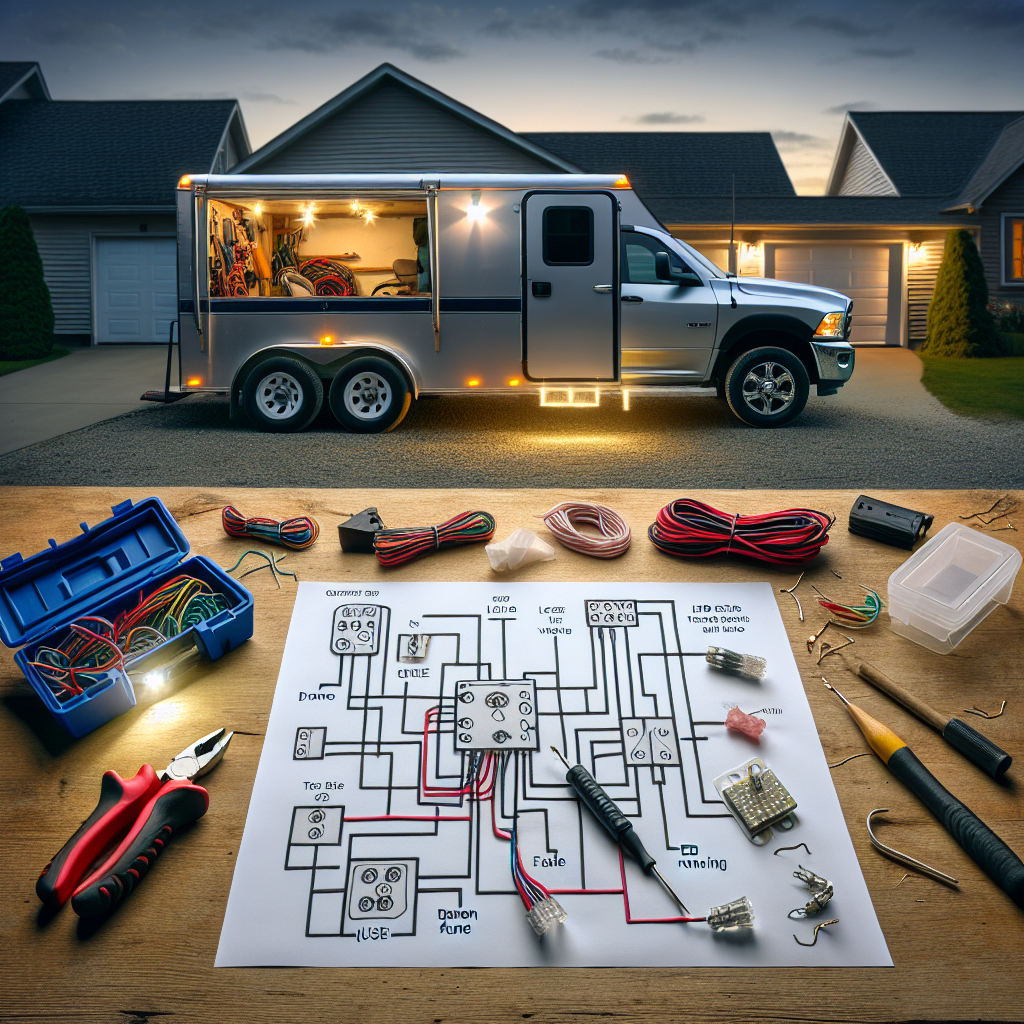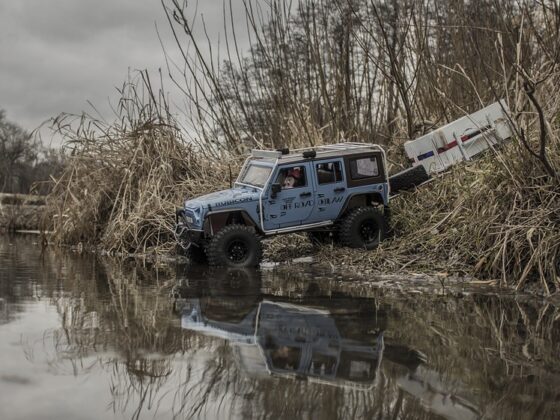Are you experiencing issues with your trailer running lights not working? Don’t worry, we’ve got you covered! In this article, we will guide you through the troubleshooting process to help you identify and fix the problem. Whether you’re preparing for a road trip or needing to tow something, having properly functioning running lights on your trailer is crucial for safety. So, let’s get started and get those lights shining brightly again!
Understanding Trailer Running Lights
Definition of trailer running lights
Trailer running lights are an essential component of any trailer or towing vehicle. Also known as clearance lights or marker lights, these lights are located on the sides, front, and rear of the trailer. They emit a steady, white or amber light to ensure visibility and alert other drivers to the presence of the trailer on the road.
Importance of properly functioning trailer lights
Having properly functioning trailer lights is crucial for several reasons. First and foremost, they enhance safety on the road by making your trailer more visible to other drivers, especially in low-light situations or adverse weather conditions. These lights also indicate the length and width of your trailer, allowing other drivers to gauge the space required while passing or changing lanes.
Moreover, properly functioning trailer lights are often a legal requirement. Many jurisdictions mandate the use of working lights on trailers, and failure to comply can result in fines or even having your trailer impounded. It is important to check the local regulations regarding trailer lighting requirements to ensure compliance.
What could happen if trailer lights are not functioning
If your trailer lights are not functioning properly or not working at all, it can lead to a variety of issues and potential dangers. Firstly, it significantly decreases the visibility of your trailer, increasing the risk of collisions, particularly during nighttime or in low-light conditions. This lack of visibility also makes it harder for other drivers to judge the distance, speed, and size of your trailer, potentially leading to accidents or near misses.
Furthermore, malfunctioning trailer lights can result in legal consequences. If pulled over by law enforcement, you may face penalties for driving with non-compliant trailer lighting. This can include fines, points on your driving record, or even having your trailer taken out of service until the issues are resolved. Along with legal implications, inadequate trailer lights can also affect your insurance coverage in case of an accident, as it could be considered negligence on your part.
Common Causes of Trailer Light Failures
Incorrect wiring
One of the most common causes of trailer light failures is incorrect wiring. If the wires are not connected properly or have become loose, it can interrupt the flow of electricity and cause the lights to malfunction. This can occur during the initial installation of the trailer lights or due to wear and tear over time. It is essential to ensure the wires are securely connected and follow the correct wiring diagram for your trailer.
Blown fuse
Another frequent culprit behind trailer light failures is a blown fuse. The fuse protects the electrical system by breaking the circuit in case of excessive current flow. If you experience a sudden loss of trailer lights, it is worth checking the fuse box to see if the fuse responsible for the lights has blown. Replacing the blown fuse with a new one of the correct rating is often a simple and effective solution.
Corroded wire connections
Corroded wire connections can also lead to trailer light failures. Over time, exposure to moisture, road salt, and other environmental factors can cause the wires to rust and corrode. This corrosion creates resistance in the electrical circuit, affecting the proper functioning of the lights. Regular inspection and cleaning of wire connections can help prevent this issue, ensuring optimal electrical conductivity.
Burnt-out bulbs
Just like with any other light source, trailer bulbs eventually burn out and need to be replaced. Burnt-out bulbs are a common reason for trailer light failures. It is important to regularly check and replace any bulbs that have stopped working to maintain the functionality and visibility of your trailer lights. Carrying spare bulbs can be a lifesaver, especially during long trips or in remote areas where finding replacements may be challenging.
Faulty light switch
In some cases, a faulty light switch may be to blame for trailer light failures. The switch controls the flow of electricity to the lights, and if it malfunctions or becomes damaged, it can disrupt the circuit. An intermittent or non-responsive switch can cause flickering, dimming, or complete failure of the lights. Testing the switch and replacing it if necessary can help resolve this issue.

Identifying the Problem
Inspecting the wiring
To identify the problem with your trailer lights, start by inspecting the wiring connections. Check for any loose or disconnected wires, frayed insulation, or signs of damage. Ensure that all wires are securely connected and there is no corrosion present. If you notice any issues, repair or replace the damaged wiring as needed.
Checking the fuse
If your trailer lights are not working, one of the first steps is to check the fuse responsible for the lights. Locate the fuse box, usually found under the dashboard or in the engine compartment, and use a fuse puller to remove the relevant fuse. Examine the fuse to see if the filament inside is intact or if it is visibly blown. If the fuse is blown, replace it with a new one of the same rating and test the lights again.
Testing the bulbs
When troubleshooting trailer light failures, it is essential to test the bulbs for any issues. Start by removing the bulbs one by one and visually inspecting them for signs of damage or burnt-out filaments. If any bulbs appear faulty, replace them with new ones. Additionally, using a multimeter or circuit tester, check the continuity of the bulbs to ensure they are working properly.
Examining the light switch
If the wiring, fuse, and bulbs check out, the next step is to examine the light switch. Inspect the switch for any visible damage or signs of malfunction. Use a multimeter to test the switch’s continuity and determine if it is functioning correctly. If the switch is faulty, replacing it should resolve the issue with your trailer lights.
Connecting with a different vehicle for testing
If you have exhausted all other troubleshooting steps and are still unable to identify the problem, connecting your trailer to a different vehicle can help determine whether the issue lies with the trailer or the towing vehicle. If the lights work properly when connected to a different vehicle, it indicates that the problem lies with the original towing vehicle’s electrical system. In such cases, it may be necessary to consult a professional for further diagnosis and repairs.
Tools Needed for Troubleshooting
Multimeter
A multimeter is a versatile tool that allows you to measure voltage, current, and resistance. It is invaluable for troubleshooting electrical issues, including trailer light failures. Use a multimeter to test the continuity of wires, bulbs, and switches, helping you pinpoint the source of the problem.
Circuit tester
A circuit tester is a simple but effective tool for identifying electrical faults. It allows you to check if there is power flowing through a circuit, helping you determine if a specific component, such as a bulb or switch, is causing the light failure.
Replacement bulbs
Having a set of replacement bulbs is essential for troubleshooting trailer light failures. Burnt-out or damaged bulbs can easily be replaced, restoring the proper functionality of your trailer lights.
Wire brush
To clean corroded wire connections, a wire brush is invaluable. Use it to remove rust and corrosion from wires, ensuring optimal electrical conductivity. A clean and secure connection is vital for proper trailer light functioning.
Fuse puller
A fuse puller is a small tool specifically designed to remove fuses from their sockets. It makes it easier and safer to extract a blown fuse and replace it with a new one.

Troubleshooting Step by Step Procedures
Procedure to inspect and repair wiring
- Disconnect any power sources and ensure safety.
- Inspect the wiring connections visually for loose or disconnected wires, frayed insulation, or signs of damage.
- Repair or replace any damaged wiring using the appropriate tools and techniques.
- Securely reconnect all wires, ensuring a proper and tight connection.
- Test the trailer lights to ensure they are functioning as expected.
Process for checking and replacing fuse
- Locate the fuse box, typically found under the dashboard or in the engine compartment of your towing vehicle.
- Using a fuse puller, carefully remove the fuse responsible for the trailer lights.
- Inspect the fuse for any signs of damage or a blown filament. If the filament is intact, the fuse is likely not the cause of the issue.
- If the fuse is blown, replace it with a new one of the same rating, ensuring it is securely seated in the fuse socket.
- Test the trailer lights to verify if they are working properly.
Techniques for testing bulbs
- Remove each bulb from its socket one by one.
- Visually inspect the bulbs for any signs of damage, such as burnt filaments or cracks.
- If a bulb appears faulty, replace it with a new one of the same type and rating.
- Use a multimeter or circuit tester to check the continuity of the bulbs. Touch the probes to the bulb’s contacts while it is removed from the socket and verify if the tester indicates continuity.
- Replace any bulbs that do not show continuity or are otherwise determined to be faulty.
How to inspect and fix light switch
- Examine the light switch for any visible damage, such as cracks, burned marks, or loose wires.
- Use a multimeter to test the continuity of the light switch.
- Disconnect any power sources and follow the manufacturer’s instructions for removing and replacing the light switch.
- If the light switch is faulty, replace it with a new one compatible with your trailer’s electrical system.
- Test the trailer lights after the light switch replacement to verify if they are functioning correctly.
Safety Measures while Troubleshooting
Turning off the power supply
Before conducting any troubleshooting or repairs, always turn off the power supply to avoid electrical shocks or damage to the electrical system. Disconnecting the battery or unplugging the trailer from the towing vehicle is a crucial safety measure.
Wearing appropriate protective gear
While troubleshooting trailer light failures, it is important to protect yourself by wearing appropriate protective gear. This may include safety glasses, gloves, and other personal protective equipment to prevent injuries during the inspection and repair process.
Avoiding wet or damp conditions
Working with electrical systems in wet or damp conditions can significantly increase the risk of electrical shocks. Always perform troubleshooting and repairs in dry conditions or indoors to ensure your safety.
Following manufacturer’s instructions
When using any tools or equipment during the troubleshooting process, it is essential to follow the manufacturer’s instructions for safe and proper usage. This helps minimize the risk of accidents and ensures that you are using the tools correctly.

Tips for Regular Maintenance of Trailer Lights
Cleaning and waxing metal trailers to avoid corrosion
Regularly cleaning and waxing metal trailers can help prevent corrosion and rusting, prolonging the lifespan of the trailer lights. Use appropriate cleaning agents and rust inhibitors to protect the metal surfaces from environmental factors that can lead to corrosion.
Replacing lights and wiring before they fail
To avoid sudden light failures on the road, consider replacing trailer lights and wiring before they fail. Over time, the wires may become worn or damaged, and bulbs may burn out. Taking a proactive approach to replace these components can prevent inconvenience and potential safety hazards during your travels.
Keeping spare bulbs and fuses on hand
Always carry spare bulbs and fuses specific to your trailer’s electrical system. These small, inexpensive components can save you from being stranded on the roadside if a light failure occurs during your journey. Replace any used spares immediately to ensure you are always prepared.
Regularly testing lights before travel
Before embarking on a trip with your trailer, make it a habit to regularly test all the lights. Turn on the headlights, brake lights, and turn signals, and walk around the trailer to ensure all lights are functioning correctly. This simple step can prevent avoidable issues and ensure the safety of you and other drivers on the road.
Understanding When to Call a Professional
Serious electrical issues
If you encounter serious electrical issues with your trailer lights, such as extensive wiring damage or persistent shorts in the circuit, it is recommended to call a professional for assistance. They have the expertise and specialized tools to diagnose and repair complex electrical problems effectively and safely.
Multiple lights not working
If multiple trailer lights are not working simultaneously, it indicates a more significant problem that requires professional attention. This could be due to a fault in the towing vehicle’s electrical system or a complex issue within the trailer’s wiring or light assembly. A professional electrician or trailer repair technician can accurately diagnose and resolve these types of issues.
Continued problems after troubleshooting
If you have followed the troubleshooting steps outlined earlier and are still experiencing problems with your trailer lights, it may be time to consult a professional. They can offer additional guidance, conduct more in-depth diagnostics, and provide an accurate assessment of any underlying issues that may be present.
Lack of tools or experience for repair
If you lack the necessary tools or experience to perform electrical repairs, it is best to seek professional assistance. Working with electrical systems can be dangerous if not done correctly, and it is crucial to prioritize your safety and the proper functioning of your trailer lights.

Calling a Professional: What to Expect
Scheduling and preparation
When you call a professional for assistance with your trailer lights, they will typically schedule a convenient time for an inspection or repair. They may ask questions about the type of trailer, the nature of the problem, and any troubleshooting steps you have already taken. Being prepared with this information will help the professional understand the situation better and come prepared with the necessary tools and replacement parts.
Cost and duration of repair
The cost and duration of the repair will depend on the nature and complexity of the issue, as well as the rates of the specific professional or repair shop. The professional will assess the problem, provide a diagnosis, and provide an estimate of the repair costs and the time required to complete the repair.
Post-repair steps and checks
After the repair is complete, the professional should test the trailer lights to ensure they are working correctly. They may also provide recommendations for ongoing maintenance or any additional steps you can take to prevent future issues. Following their advice and keeping up with regular maintenance will help extend the lifespan of your trailer lights.
Warranties or guarantees
Professional repair services may come with warranties or guarantees on the work performed. This provides you with peace of mind knowing that if the issue reoccurs within a specified period, you can have it resolved without incurring additional costs. It is important to clarify the details of any warranties or guarantees with the professional before initiating the repair.
Preventing Future Trailer Light Failures
Regular inspections
Regularly inspect your trailer lights for any signs of damage, wear, or malfunction. Check the wiring connections, bulbs, and light assemblies for proper functioning. Catching and addressing any issues early can prevent sudden failures and ensure the safety of your travels.
Preventive replacements
Consider replacing trailer lights, wiring, and switches preventively before they fail. As these components age, they become more prone to failure and can compromise the functionality and safety of your trailer lights. By replacing them proactively, you can avoid potential issues down the road.
Protecting wires from damage
Take measures to protect the trailer’s wiring from damage. Secure the wires properly and avoid exposing them to sharp edges, excessive vibrations, or extreme weather conditions. Consider using wire loom or protective conduit to shield the wires from physical damage.
Using high-quality replacement parts
When replacing trailer lights or their components, invest in high-quality replacement parts. Quality components are often more reliable, durable, and resistant to corrosion. While they may cost slightly more upfront, they can save you money and frustration in the long run by reducing the frequency of failures and the need for frequent replacements.
In conclusion, understanding trailer running lights and troubleshooting their failures is crucial for the safety and legality of towing a trailer. By familiarizing yourself with the common causes of trailer light failures, learning the step-by-step troubleshooting procedures, and knowing when to call a professional, you can ensure your trailer lights are in optimal working condition. Regular maintenance, preventive replacements, and responsible usage of high-quality replacement parts can further minimize the risk of future failures, allowing for safe and worry-free towing experiences.









